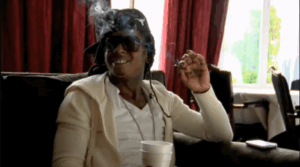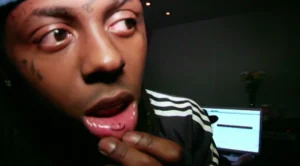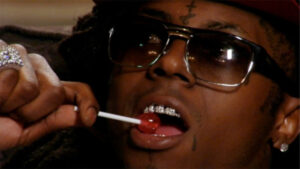Publication Date: 11-12-2025
The Carter (2009) review
Dir. Adam Bhala Lough
By: Steve Pulaski
Rating: ★★★
The Carter opens with Lil Wayne in his lavish home, working at his table when he aimlessly wanders over to his couch right in front of his TV. The TV is airing some random show and Wayne quickly takes note that one of the show’s characters is wearing a shirt with his face on it and boasting the caption “BEST RAPPER ALIVE.” Wayne is humbled, almost awestruck. “That’s my name on that motherfucker,” he tells one of his associates.
This is one of the many, many reasons why Lil Wayne is one of the most charismatic and captivating artists of our generation. His ability to be boastful one minute, humble the next, and a crazy genius nearly all the time is precisely his attraction as an artist. His cocky, assured swagger isn’t only present in his music, but in his interviews, many of which he’ll stop halfway, as seen in this documentary, if he doesn’t like the interviewer or their questions. This “short-fuse” nature he brings to the table is also evident when we are told in the beginning of the documentary that Wayne withdrew his support from the film halfway through and then tried to sue to prevent it from seeing the light of day.

The funny thing about that is The Carter is not a disrespectful film; it’s decidedly impressionistic, following Lil Wayne during the most successful time in his career which was before, during, and after the release of his sixth album Tha Carter III. Following monstrous success with the album’s many singles – the infectious “Lollipop,” with the late Static Major; the rowdy and briskly paced “A Milli,” which brought “mixtape rap” into the mainstream; and the crazy “Get Money” featuring the likes of T-Pain. Tha Carter III went on to go platinum in one week, eventually earning that accolade twice more from the RIAA to cap out at over 3.6 million albums sold. I fondly remember anticipating Tha Carter III like it was my birthday, before downloading it and relishing its variety, its lyrical humor, and Wayne’s unabashedly goofy metaphors and undeniable swagger with nearly every track.
The Carter shows him at the height of his game and during one of his most tumultuous stints in pop culture. This was a time when Wayne’s weed and purple drank (a famous concoction amongst rappers including promethazine/codeine cough syrup, Sprite, and a Jolly Rancher) use was just as out of control as his public persona. Journalists and rap fans were, in a way, waiting for Wayne to kill himself with the famous beverage like rapper Pimp C did just a year prior, and all eyes were on Wayne, his music, and his unique character. Shot like a Frederick Wiseman documentary, with no interviews and an emphasis on situations instead of talking heads, The Carter has Wayne in numerous scenes, rapping, freestyling, preparing for a concert, or sipping his beloved purple drank. In one scene, Wayne opens a suitcase filled with supplies he uses in emergencies and one of the items, placed precariously next to about perhaps $100,000 in cash money, is a large bottle of Vitamin Water, however, its contents are deceiving. Wayne swishes the liquid in the bottle around, so we can see its thickness, “shit ain’t no Vitamin Water,” he says with a smile.

The film shows Wayne predominately being the workaholic he is, occasionally stopping to voice his relationship with Bryan “Birdman/Baby” Williams, CEO of Cash Money Records and father figure to Wayne since he was a young boy. Wayne also talks his roots in Hollygrove, a low-income town of New Orleans that frequently gets a nod in many of Wayne’s songs. We also get a glimpse of his beloved daughter Reginae, and, in one scene, see her giving her own freestyle to “Stuntin’ Like My Daddy,” a song her father did with Birdman, showing that, much like her father, she has an affinity for bars.
The thing about Wayne’s music is even his weaker songs have bright spots, specifically Wayne’s outlandish metaphors and one-liners (“we pop ’em like Orville Redenbacher,” “I peel off in the Lamborghine like a tangerine. Got the industry straight shakin’ like a tambourine,” and so forth). He’s even more fun to watch perform; consider the scene when he gives a ribald performance of his song “A Milli,” whilst shaking his dreadlocks, rolling on the floor, and almost breakdancing in front of an energized crowd. This comes minutes after he was sipping drank and purring the lines, “I’m gettin’ nervous” in front of his affiliates and saying a prayer for his fans and themselves.
Wayne’s dualities make him such a fascinating character, worthy of a documentary that could’ve been twice the length of the seventy-five minute Carter. Even his songwriting methods are intriguing, largely because they are nonexistent. Wayne doesn’t believe in writing down anything in journals or notebooks because that is evidence that could either be sold or distributed (his Carter III album was already leaked eight days before its release). With this practice, all Wayne’s benign thoughts and quirky lyricism remain in his head, and it’s a tellingly bold way to write, given how elaborate, layered, and sometimes breakneck fast Wayne songs can be.

The Carter could’ve even kept going past Wayne basking in the fame and the success Tha Carter III brought by focusing on production of Wayne’s seventh album, the frequently mocked and critically panned Rebirth. Rebirth was a turning point for Wayne because it was his rock album, where he placed strong emphasis on raucous heavy metal instrumentals, loud guitar riffs, and a brazen change in direction. Coming off of 2008’s bestselling album, Wayne had made yet another questionable move that may have resulted in a complete change in perspective (Wayne’s mainstream status began to falter with the singles of Rebirth failing to assert themselves the same way “Lollipop” and “Get Money” did and a subsequent prison sentence for the artist about a year later resulted in less publicity centered around music). While Rebirth may not be an amazing album, I’ve found that it’s a true testament to Wayne’s complete craziness and unpredictability as an artist, though I do not challenge anyone who claims to hate it. The few recording sessions of the album we get to see in The Carter are a real treat, though, no matter which way you slice it.
The Carter is a beautifully low-key documentary on rap’s biggest rock star and renaissance man, a soul who cannot be matched as far as being an intoxicating (and largely intoxicated) presence. One scene where an interviewer asks Wayne what he would do if he were president gives you the best idea of Wayne’s character. He reveals that he’d lower gas prices, legalize weed, end child support and the loss of finances that men seem to always find themselves in amidst a divorce, put cocaine back into the Coca-Cola formula, and allow steroid use in baseball. At the very end of it all, he confidently states, “vote Weezy for president.”
Directed by: Adam Bhala Lough.
About Steve Pulaski
Steve Pulaski has been reviewing movies since 2009 for a barrage of different outlets. He graduated North Central College in 2018 and currently works as an on-air radio personality. He also hosts a weekly movie podcast called "Sleepless with Steve," dedicated to film and the film industry, on his YouTube channel. In addition to writing, he's a die-hard Chicago Bears fan and has two cats, appropriately named Siskel and Ebert!


